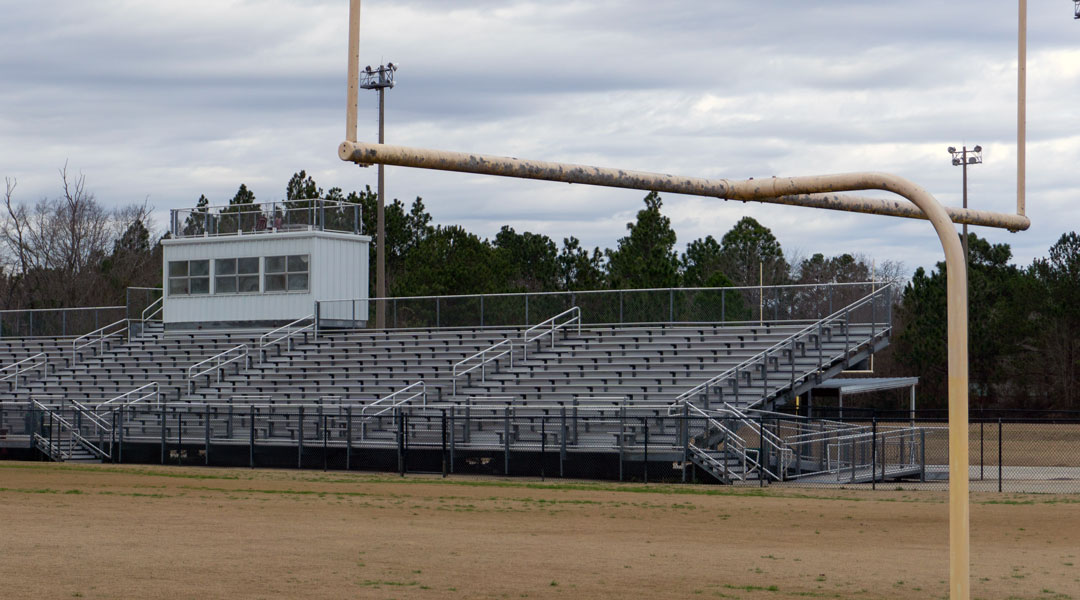Pelion High School’s football field stands empty in the middle of the football offseason. (Photo by Dylan Jackson)
TJ Marsh’s phone started blowing up on Jan. 2 after Damar Hamlin collapsed on an NFL field.
“That night was reliving March the 8th all over again,” said Marsh, who was an athletic trainer at Gilbert High School that day in 2020.
March 8 was the day Marsh saved the life of Grayson Selepes, a baseball player at J.F. Byrnes High School in Spartanburg County.
A player from Charleston’s Bishop England High School had hit a fly ball in the sixth inning of a tournament. Selepes, the center fielder, ran full speed before colliding with his teammate, the shortstop. They landed 20 feet apart.
Selepes tried to stand, but collapsed, similar to what happened to Hamlin.
“I didn’t have 26 healthcare professionals standing behind me,” Marsh said. “I had me, and thank God, I had two nurses that showed up.”
South Carolina high school athletic trainers don’t have the same resources as professional sports teams. Every school has a defibrillator.
But ambulances and large training staffs are hard to come by.
Those nurses weren’t supposed to be at Gilbert High. Both had shown up early for the following game. One was at the pay gate and another was still parking their car.
“When the one at the pay gate heard the request for medical help on the field, she just took off running through the third-base gate,” Marsh said. “She saw the other (nurse) running on to the field, she stopped and said, ‘Hey, something bad happened. I gotta go,’ and ran on to the field.”
They performed CPR for about three minutes. When Selepes remained unresponsive, they shocked him and continued CPR.
By the time the defibrillator was ready for a second shock, Selepes was breathing and physically responsive.
It took seven minutes for EMS to arrive. That wait could be a crucial decider in life or death situations. Selepes recovered.
That isn’t the only instance of S.C. high school athletes collapsing. In 2021, Dutch Fork football player Jack Alkhatib died during a practice due to an undiagnosed rare heart condition.
Gray Collegiate Academy basketball player Mychael Mitchell collapsed on the court Jan. 17 and required CPR. He regained consciousness and was taken to a local hospital.
Lexington County requires ambulances to be present for varsity football games. However, many districts throughout the state don’t have the same requirements.
Pelion High School in Lexington County hires a private emergency services company to be on site at varsity football games.
“Lexington County EMS, which is probably the same with Richland County, they don’t cover our games,” said Zach Richards, the head athletic trainer at Pelion High School. “It’s getting tougher and tougher to find (private companies to provide that service).”
Richland School District 1 works with EMS to place ambulances at varsity football games, but they’re not required.
Most sports don’t have ambulances on site, such as the baseball game when Selepes collapsed.
“Sometimes they don’t have (ambulances) at the site because it’s the only one that exists in the town,” said Jerome Singleton, commissioner of the South Carolina High School League. “Even if they are on a site, they make themselves available to other emergencies that come up.”
Schools take other precautions, including having emergency action plans, which the South Carolina High School League requires, that are updated yearly.
Automatic external defibrillators are electronic, portable devices designed to diagnose heartbeat irregularities.
Defibrillators have been supplied to member schools for 30 years, Singleton said.
“We’ve kind of gone by the golden rule here, that we want all of our AEDs (defibrillators) within two minutes of every facility,” Richards said.
Marsh had a defibrillator behind first base. She used it to shock Selepes after he collapsed on the baseball field.
Trainers often aren’t provided for certain sports. Marsh was present to revive Selepes because Gilbert High was hosting a baseball tournament.
“It is not feasible financially or logistically that every school could have a designated trainer for all of their content,” Singleton said. “Look into the spring sports season. There are multiple sports going on at the same time.”
That means all coaches are required to have yearly CPR training.
“They’re our first responders that we know have some knowledge about (CPR),” Singleton said. “Are they great at it? They practice it all time.”
But good outcomes can come down to how quickly an ambulance arrives at the scene, even with all of those precautions.
In Hamlin’s case, an ambulance was on site, but high schools don’t have those same resources.
“I am very confident in my emergency care, and I think most athletic trainers are,” said Christy Gindhart, the head athletic trainer at A.C. Flora High School who works there through a Prisma Health program. “The problem is, do we have the supplies and the ability and the timing for that? There’s a lot of applause that it happened quickly and everyone moved fast. And the thing is, most of us can do that. But then we’re waiting on an ambulance.”
Flora has five athletic trainers in total, which is rare for high school athletics. Other schools such as Pelion and Dutch Fork have two to three.
“I’ve come from a lot of places where it was just me,” Gindhart said. “And I know there’s a lot of schools around here that are just one person as well.”
Gindhart and Richards said they work about 60 hours per week during football season.
“One coach may want to practice at eight in the morning,” Richards said. “And the next coach wants to practice at six at night. So then it’s a balancing act.”
High school athletic trainers work behind the scenes to ensure safety for their athletes.
“I always say you’re overworked, underpaid, and under-appreciated,” Gindhart said. “People understand the importance of what you can do. But some people are just ignorant to that.”
ABOUT THE JOURNALISTS

Dylan Jackson
Jackson is a senior journalism major at the University of South Carolina. Interested in sports and social media, Jackson has interned with the Columbia Fireflies (Class A affiliate of the Kansas City Royals) and Pro Football Focus. His portfolio ranges from writing to photo/video content.

Jacob Phillips
Phillips is a senior journalism major at the University of South Carolina. He is the sports editor of The Daily Gamecock and a freelance reporter covering South Carolina high school sports. He also has reported in depth on state road safety issues. Raised in Charlotte, he took an interest in journalism while watching his parents work at the city’s various local news stations.


